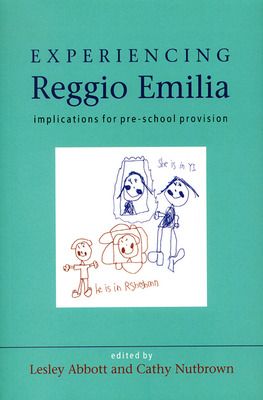Experiencing Reggio Emilia
1st Edition
0335207030
·
9780335207039
© 2001 | Published: July 16, 2001
Early Education, internationally, is the focus of much challenge and debate. Various approaches to teaching young children are being developed and advocated, but the focus is often on curriculum content with the processes of learning as a secondary i…
Read More
Request Review Copy
Receive via shipping:
- Colour, print bound version of the complete text
Acknowledgements
Preface
Experiencing Reggio Emilia
Perceptions of play: a question of priorities
Listening and learning
The role of the pedagogista
Sunniva's extra pocket: a parent's reflections
Sam's invisible extra gear: a parent's view
Special needs or special rights?: A question of inclusion
Creating places for living and learning
'She's back!' the impact of my visit to Reggio Emilia on a group of three and four year olds
Journeying above the 'sea of fog': reflections on personal professional development inspired by Reggio
A journey into reality
Creating a palette of opportunities: situations of learning in the early years
The otherness of Reggio
Questions and challenges: continuing the dialogue
Index.
Preface
Experiencing Reggio Emilia
Perceptions of play: a question of priorities
Listening and learning
The role of the pedagogista
Sunniva's extra pocket: a parent's reflections
Sam's invisible extra gear: a parent's view
Special needs or special rights?: A question of inclusion
Creating places for living and learning
'She's back!' the impact of my visit to Reggio Emilia on a group of three and four year olds
Journeying above the 'sea of fog': reflections on personal professional development inspired by Reggio
A journey into reality
Creating a palette of opportunities: situations of learning in the early years
The otherness of Reggio
Questions and challenges: continuing the dialogue
Index.
Early Education, internationally, is the focus of much challenge and debate. Various approaches to teaching young children are being developed and advocated, but the focus is often on curriculum content with the processes of learning as a secondary issue. The most important consideration in early education is the way in which young children learn. Their transferable skills of communication, collaboration and investigation can underpin all aspects of learning. These elements form the main focus of work in a group of pre-schools in an area of Northern Italy which has earned an international reputation for innovative practice and pedagogy.
The experience of Reggio Emilia, in providing challenges to accepted approaches to early childhood education in many countries, is widely acknowledged. Since 1963, when the Italian municipality of Reggio Emilia began setting up its network of educational services for 0-6 year olds, the 'Reggio Approach' has gained worldwide recognition. Numerous visitors have been impressed by the acknowledgement given to the potential of children, the organisation and quality of the environments created, the promotion of collegiality and a climate of co-participation of families in the educational project.
This book reflects the impressions and experiences of the Reggio Emilia approach gained by a range of early childhood educators following a study visit to the region. It focusses on key issues such as staffing, training, working with parents, play, learning, the culture of early childhood, and special educational needs, from a variety of perspectives and will provide a welcome challenge to thinking for both practitioners and policy makers.
The experience of Reggio Emilia, in providing challenges to accepted approaches to early childhood education in many countries, is widely acknowledged. Since 1963, when the Italian municipality of Reggio Emilia began setting up its network of educational services for 0-6 year olds, the 'Reggio Approach' has gained worldwide recognition. Numerous visitors have been impressed by the acknowledgement given to the potential of children, the organisation and quality of the environments created, the promotion of collegiality and a climate of co-participation of families in the educational project.
This book reflects the impressions and experiences of the Reggio Emilia approach gained by a range of early childhood educators following a study visit to the region. It focusses on key issues such as staffing, training, working with parents, play, learning, the culture of early childhood, and special educational needs, from a variety of perspectives and will provide a welcome challenge to thinking for both practitioners and policy makers.

